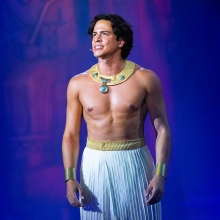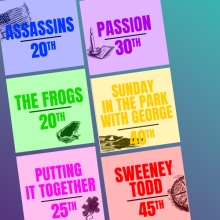
Full Synopsis
Act One
The show starts in Shubert Alley on the opening night of Funny Boy!, a musical version of Hamlet, produced by the indefatigable Max Bialystock. The usherettes enter, wondering whether the show will be a hit or not. As patrons begin to exit the theatre, the answer is clear: it's the worst show in town ("It's Opening Night"). A tuxedo-clad Max appears. He tries to figure out what went wrong. He used to be the toast of Broadway and now he's a disaster. He vows to be on the top again ("The King of Old Broadway").
We transition to Max's once elegant, now shabby, office, in which he is living. He is startled awake by a knock at the door. It is a schlubby accountant named Leo Bloom, who has come to handle Max's books. One of Max's investors, an elderly lady to whom he refers as Hold Me-Touch Me, suddenly comes by. Max forces Leo to hide in the bathroom. Hold Me-Touch Me has brought Max a check, but she won't give it to him until he plays one dirty game with her. Leo accidentally walks in on them and immediately returns to the bathroom until she leaves.
Once Hold Me-Touch Me is gone, Leo apologizes for interrupting Max. Max is prepared to be mad at Leo but, surprisingly, Leo is a fan; he reveals a secret desire to be a Broadway producer. Max tells him just to do the books. Leo realizes that Max's books do not add up, but when he tries to tell Max, he gets so nervous that he ends up in a fetal position on the floor. Max finally coaxes him off of the floor, and Leo explains the discrepancy: the show raised $100,000, but only cost $98,000. Max begs Leo to help him hide that small amount of money, rather than sending him to jail. Leo agrees, as the IRS is unlikely to look through the books of a flop show. Max then makes a simple observation: under the right circumstances, one could make more money with a flop than with a hit. Suddenly, Leo is listening.
Max explains: the first step – find the worst play ever written, the second step – find the worst director in town, the third step – raise two million dollars, the fourth step – hire the worst actors in town, the fifth step – open on Broadway and the final step – run away to Rio with the money! Leo is unconvinced, but Max tries to sell him the idea ("We Can Do It").
Leo returns to the drudgery of his accounting job. After being berated by his boss for being six minutes late, he imagines what it would be like to have his dream of producing a Broadway show come true ("I Wanna Be a Producer"). He quits his job and returns to Max's office, exclaiming that he wants everything he's ever seen in the movies ("We Can Do It – Reprise"). Max and Leo begin to pour over scripts in Max's office. The plays are bad, but not bad enough. Finally, Max finds the worst play ever written – Springtime for Hitler: A Gay Romp with Eva and Adolf at Berchtesgaden.
In the West Village, Franz Liebkind, the author of Springtime for Hitler, tends to his pigeons on his roof. He wears lederhosen and a German Army helmet and sings an ode to his homeland ("In Old Bavaria"). When Max and Leo arrive, Franz is skeptical of their intent. However, he is thrilled with the prospect of clearing the Führer's name on Broadway. He won't sign the deal with Max and Leo unless they prove that they will do justice to the Führer's memory by joining him in the Führer's favorite song and dance. He also makes them take the sacred Siegfried Oath, never to dishonor the memory of Adolph Elizabeth Hitler, as the Führer was descended from a long line of English queens ("Der Guten Tag Hop-Clop"). Leo worries that they're in too deep, but Max assures him that he'll let him know when they're in too deep. They take the Oath and the rights are theirs.
Next, they go to the home of noted director, Roger De Bris. Carmen, his assistant, is fielding phone calls when Max and Leo enter. De Bris enters in a silvery full-length Art Deco gown. He tells Max that Franz's play is remarkable, but too dark and depressing for him to direct ("Keep It Gay"). However, when Max dangles the idea of a Tony, De Bris signs on to the project.
Back in the office, a gorgeous, young Swedish woman named Ulla enters. She wants to audition; she knows that she has what it takes to get their attention ("When You've Got It, Flaunt It"). Max offers her the part and the side job of secretary/receptionist until rehearsals begin. Max then explains to Leo that producers never put their own money into a show, so now he must go pay a visit to Little Old Lady Land. Max does what he has to do and literally puts his backers on their backs ("Along Came Bialy"). By the end, he has raised enough money to do the show and Springtime for Hitler is slated for Broadway.
Act Two
Max and Leo arrive at the office to find that Ulla has tidied up the office "Swedish" style; everything is high gloss white. Max gets cash from the safe and exits to pay the Shubert's rent for the theatre. Alone, Ulla comes onto Leo, and he responds in kind ("That Face").
At auditions, the creative team sees a series of terrible actors trying to dance and sing, each singing Hitler worse than the one before ("Audition Opening / The Little Wooden Boy"). During one particularly bad rendition, Franz jumps up on stage himself to show an actor how it's done. His performance takes the cake and he is cast as his hero ("Have You Ever Heard the German Band?).
We flash-forward to opening night, where the usherettes are standing by ("It's Opening Night – Reprise"). Leo, feigning ignorance, wishes everyone good luck. Roger and Carmen are aghast – they remind him of the old theatre tradition of that phrase ("It's Bad Luck to Say Good Luck on Op'ning Night"). In the excitement, Franz actually does break a leg. The show must go on, however, and Max insists that De Bris go on as Hitler.
The scene transforms to the show within the show, featuring Roger's big number. There are a squad of tap-dancing storm troopers and follies girls with headdresses of giant pretzels, bratwurst and beer steins; the number is tasteless, offensive... and hysterical. At the end of the dance section, De Bris as Hitler sits at the edge of the stage, à la Judy Garland, and sings to the audience. This is followed by the entrance of Stalin, Churchill and FDR, who are defeated by the singing/tap dancing Hitler. The number ends with the storm troopers forming a swastika that rotates clockwise and chorus girls astride cannon ("Springtime for Hitler").
When the audience leaves, Max and Leo await the negative reviews. But, much to their shock and dismay, the show is a hit! Leo and Max can't figure out how this is possible ("Where Did We Go Right?"). Leo takes the account books and is going to turn himself in when De Bris and Carmen enter. They are soon followed by Franz, who is brandishing a gun, furious that they have made fun of Hitler. Pandemonium then ensues – the gun eventually goes off, and the police break in to try to arrest the alleged shooter, Franz, who rushes offstage and promptly breaks his other leg. The cops arrest him and find the two accounting books on the couch. Max is arrested but Leo, who has been hiding, is convinced by Ulla, who has just entered in a slinky gown, that he shouldn't turn himself in. She wants to go to Rio with him ("Leo Goes to Rio").
In a holding cell a few weeks later, Max receives a postcard from Leo and Ulla in Brazil. Max replays the entire series of events, becoming more and more upset about Leo's backstabbing ("Betrayed"). In a courtroom, Max is about to be sentenced when Leo reappears. He hands over the remains of the two million dollars to the judge and reaffirms his friendship with Max ("'Til Him"). The judge, not wishing to break up such a touching friendship, sentences them both to five years in Sing Sing.
We transition to Sing Sing, at a rehearsal for Prisoners of Love, the latest production by Bialystock and Bloom. As the title song is being sung by the prisoners, a trustee enters with a pardon for Max, Leo and Franz ("Prisoners of Love"). They all celebrate as we transition to the Broadway production of Prisoners of Love. Ulla and De Bris appear as the stars. The show is in its fourth successful year on Broadway – Max and Leo have become true success stories.
Show History
Inspiration
Based on the 1968 Mel Brooks film, The Producers musical was an idea that had been suggested to Brooks for many years, but which he always rejected. It was the famed record and movie producer, David Geffen, who finally convinced Brooks that a stage version of the show would add to the legacy of the film, rather than detract from it. Brooks calls Geffen "the most persuasive, smartest guy that ever lived." Geffen also convinced Brooks that he, Brooks, should be the one to write the score.
Finally convinced, Brooks contacted book writer, Tom Meehan, in 1998. They had collaborated on the films, To Be or Not to Be and Spaceballs. Brooks also invited the husband and wife team of Mike Ockrent and Susan Stroman to join the team as director and choreographer, respectively. But, in 1999, Ockrent's life was cut tragically short when he died from acute leukemia. Brooks convinced Stroman that she had to continue involvement in the show and should take over the directorial duties as well... that work was what she needed to help her heal. Stroman agreed.
Productions
The Producers is a musical adapted by Mel Brooks and Thomas Meehan from Brooks' 1968 cult classic film of the same name, with lyrics written by Brooks and music composed by Brooks and arranged by Glen Kelly and Doug Besterman. As in the film, the story concerns two theatrical producers who scheme to get rich by overselling interests in a Broadway flop.
Rehearsals for the show began on December 11, 2000, before the opening of its out-of-town tryout at Chicago's Cadillac Palace Theater from February 1, 2001, through February 25, 2001. The reviews were ecstatic and the Chicago run quickly sold out.
Under the direction of Susan Stroman, the show then arrived on Broadway at the St. James Theater on March 22, 2001, where it began previews leading up to its official opening on April 19, 2001. Starring Nathan Lane and Matthew Broderick, The Producers quickly became the hottest ticket in the history of Broadway, hailed by critics and audiences alike. The show dominated the awards season that year, winning a record twelve Tony Awards and going on to run for 33 previews and 2,502 performances before closing on April 22, 2007.
During and following its Broadway run, The Producers spawned a successful London production that ran for just over two years, two U.S. national tours, a UK tour and many productions worldwide, including a production in 2012 at the Hollywood Bowl with such notables as Jesse Tyler Ferguson, Rebecca Romijn, Roger Bart and Gary Beach.
Cultural Influence
- In addition to the many regional and international productions mounted, The Producers was made into a musical movie in 2005. The movie... based on the musical... based on the movie was directed by Susan Stroman and starred most of the original Broadway cast, including Nathan Lane and Matthew Broderick.
- A soundtrack from the 2001 original Broadway cast, as well as one from the 2005 film cast, were both released by Sony Records.
- On the television show, "Curb Your Enthusiasm," The Producers was featured in almost every episode of Season four.
Trivia
- The Producers is, quite simply, the winningest Broadway musical in history. Nominated for fifteen Tony Awards, the show won twelve, breaking the record previously set by Hello, Dolly in 1964 and becoming one of the few musicals to win in every category for which it was nominated – it received two nominations for leading actor and three for featured actor.
- After the opening, The Producers broke the record for the largest single-day box office ticket sales in theatre history, taking in more than three million dollars. Then, when it was announced that Lane and Broderick would return for a limited run from December 2003 to April 2004, the show broke its own sales record with over $3.5 million in single-day ticket sales, selling out the limited-engagement immediately.
- Nathan Lane was always Brooks' first choice for Bialystock. When Lane was guest hosting on "The David Letterman Show" and Brooks was a guest, he practically forced Lane to sign a contract on the spot. Broderick was tapped for the role of Leo Bloom, based on his Tony-winning performance in the revival of How to Succeed in Business without Really Trying.
- Nathan Lane reprised his role as Max Bialystock during the show's first few months in London's West End.
Critical Reaction
"Everybody who sees The Producers – and that should be as close to everybody as the St. James Theater allows – is going to be hard-pressed to choose one favorite bit from the sublimely ridiculous spectacle... The Producers, is as full of gags, gadgets and gimmicks as an old vaudevillian's trunk. But the show, which has a book by Mr. Brooks and Thomas Meehan with songs by Mr. Brooks (you heard me), is much more than the sum of its gorgeously silly parts. It is, to put it simply, the real thing."
– New York Times
"Extraordinary tickling power... it is irresistible."
– LA Times
"It's reign as a solid, entertaining show is just beginning, and is unlikely to end any time soon."
– Talkin' Broadway
"Entirely irresistible and irrepressible confection."
– The Stage (UK)
Academy Award
Tony® Award
Outstanding Director of a Musical
Drama Desk Award
Outer Critics Circle Award
Best Lighting Design
Outstanding Orchestrations
Best Choreography
Outstanding Lyrics
Best Direction of a Musical
Outstanding Set Design of a Musical
Best Musical
Best Orchestrations
Outstanding Costume Design
Best Book of a Musical
Outstanding New Musical
Best Musical of the Season
Best Original Score
Outstanding Book of a Musical
Best Leading Actor in a Musical
Outstanding Actor in a Musical
Best Featured Actor in a Musical
Outstanding Featured Actor in a Musical
Best Featured Actress in a Musical
Outstanding Featured Actress in a Musical
Best Scenic Design
Outstanding Choreography
NY Drama Critics Circle Award
Best Costume Design
Best New Musical
Best Actor in a Musical
Connect
Billing
- Book by
- Music and Lyrics by
Based on the 1968 Film
Requirements
|
Book by
MEL BROOKS & THOMAS MEEHAN
(50%)
|
Music and Lyrics by
MEL BROOKS
(50%)
|
Video Warning
In accordance with the Performance License, you MUST include the following warning in all programs and in a pre-show announcement:ANY VIDEO AND/OR AUDIO RECORDING OF THIS PRODUCTION IS STRICTLY PROHIBITED.
Included Materials
| Item | Quantity Included |
|---|---|
| CHOREOGRAPHY MANUAL | 1 |
| DIRECTOR'S SCRIPT | 1 |
| LIBRETTO/VOCAL BOOK | 25 |
| PIANO CONDUCTOR'S SCORE ACT 1 | 2 |
| PIANO CONDUCTOR'S SCORE ACT 2 | 2 |
Production Resources
| Resource |
|---|
| HOW DOES THE SHOW GO ON-10/CS |
| HOW DOES THE SHOW GO ON? |
| KEYBOARD PATCH SOLUTIONS |
| KEYBOARDTEK |
| LOGO PACK |
| LOGO PACK DIGITAL |
| ORCHEXTRA |
| PERFORMANCE ACCOMPANIMENT RECORDING |
| PRODUCTIONPRO-DIGITAL SCRIPT/SCORE |
| REFERENCE RECORDING |
| REHEARSAL ACCOMPANIMENT RECORDING |
| REHEARSCORE APP |
| STAGE MANAGER SCRIPT |
| STAGE WRITE APPLICATION |
| TRANSPOSITIONS-ON-DEMAND |
| VIRTUAL STAGE MANAGER |
STANDARD ORCHESTRATION
| Instrumentation | Doubling |
|---|---|
| BASS | |
| CELLO | |
| DRUMS | |
| HARP | |
| HORN | |
| KEYBOARD 1 | |
| PERCUSSION | |
| REED 1 | ALTO FLUTE , ALTO SAXOPHONE , FLUTE , PICCOLO |
| REED 2 | ALTO SAXOPHONE , BASS CLARINET , CLARINET , FLUTE |
| REED 3 | CLARINET , Eb CLARINET , FLUTE , TENOR SAXOPHONE |
| REED 4 | ALTO FLUTE , CLARINET , ENGLISH HORN , OBOE , TENOR SAXOPHONE |
| REED 5 | BARITONE SAXOPHONE , BASSOON , CLARINET , CONTRABASS CLARINET |
| TROMBONE | |
| TROMBONE 2 | |
| TROMBONE 3 | |
| TRUMPET | |
| TRUMPET 2 | |
| TRUMPET 3 | |
| VIOLIN |




